- Home
- Tracy Chevalier
Falling Angels Page 12
Falling Angels Read online
Page 12
It was all terribly confusing. But above the shouts, the wind, and the whinnying horse, I heard a woman laugh. I looked around and saw her standing on the edge of the crowd, dressed entirely in white, with a great deal of lace trim which fluttered so that she looked like a bird. Her laugh was not loud exactly, but it penetrated through everything, like the rag-and-bone man’s voice as he walked along our street calling out, “Any old iron!”
Mr. Jackson came out from the cemetery gate and ran up to pull the cloth off the carriage. “Drive on!” he called. “Quickly before the horses bolt!” He ran back to the gate and swung it open, beckoning to the lead carriage. After the last carriage had passed inside the cemetery, he swung the gate shut, then picked up the bunting. As he began folding it he gazed at the crowd in front of the library, saw Mummy, and stopped folding the cloth. Mummy jerked as if someone had tapped her on the shoulder, and dropped my arm.
Then the chairman stepped down from the platform and crossed the road to retrieve the bunting. Mr. Jackson was forced to turn to him and Mummy suddenly drooped. Another gust of wind blew through the crowd and she looked as if she might topple. In a moment the laughing woman was at her side, casually taking my mother’s arm and holding her steady.
“Quite a show here, isn’t it?” she said with another laugh. “And the speeches have barely begun!”
She was a small woman, shorter than Mummy but with her shoulders thrown back in a way that made her look as confident as a taller woman. She had big brown eyes that seemed to sit right on the surface of her face so that you could not avoid their stare. When she smiled a tooth showed at the side of her mouth, reminding me of a horse baring its teeth.
I knew immediately that I would not like her.
“I am Caroline Black,” she said, holding out her hand.
Mummy stared at it. After a moment she took it. “Kitty Coleman,” she said.
I was horrified to recognize the name, though Mummy clearly didn’t. Caroline Black was a suffragette who conducted a long-running battle with various skeptical gentlemen about the subject of votes for women on the letters page of the local paper.
Daddy has been very scathing of the suffragettes. He says the word sounds like the term for a sort of bandaging technique developed in the Crimean War. The suffragettes have been chalking signs for their meetings on the pavements near us, and Daddy has occasionally threatened them—possibly even Caroline Black herself—with buckets of water.
The chairman had begun speaking again. “... The council has provided an open door through which every inhabitant of St. Pan-eras can enter without fee or without challenge to enjoy the treasures of literature enshrined and stored in this building.”
The crowd began to applaud. Caroline Black did not clap, though, and neither did Mummy. I looked around for Lavinia, but couldn’t see her. Mrs. Waterhouse and Ivy May were still close by, and I followed Ivy May’s gaze across the road. Lavinia was standing by the cemetery gate. She saw me and beckoned, pulling at the gate to show me that it was not locked. I hesitated—t did not want to leave Mummy alone with Caroline Black. On the other hand, the speeches were dull, as I had known they would be, and the cemetery would be much more interesting. I took a step toward Lavinia.
“That is all well and good, Mr. Ashby,” Caroline Black called out suddenly. I froze. “I do applaud the idea of free access to literature and education. But can we honestly celebrate such an occasion when half the population cannot apply its newly available knowledge to that part of life so important to us all? If women do not have the vote, why bother to read the treasures of literature?”
As she spoke, people around her took a few steps back so that she was alone in a circle of spectators, apart from Mummy and me standing awkwardly beside her.
Mr. Ashby tried to interject, but Caroline Black continued in a smooth voice that carried a long way and would not be interrupted. “I’m sure if our MP, Mr. Dickinson, were here he would agree with me that the subject of votes for women goes hand in hand with issues like public libraries and education for all. He is even now hoping to present a bill to Parliament about woman’s suffrage. I appeal to you”—she gestured at the circle around her—“as concerned, educated members of the public: each time you enter this building, consider the fact that you yourselves—or, if you are a man, your wives or sisters or daughters—are being denied the chance to be responsible citizens by casting your vote for those who would represent you. But you can do something about this. Come to the meetings of the local WSPU, every Tuesday afternoon at four o‘clock, at Birch Cottage, West Hill, in Highgate. Votes for women!” She bowed slightly, as if acknowledging applause only she could hear, and took a step back, leaving Mummy and me alone in the circle.
The faces surrounding us stared curiously, probably wondering if we were suffragettes too. Mrs. Waterhouse at least gave me a look of horrified sympathy. Next to her Ivy May was staring at my mother. Mummy herself was gazing at Caroline Black, and for the first time in months she was smiling.
I looked across to the cemetery gate, but Lavinia was no longer there. Then I caught a glimpse of her inside the cemetery just before she disappeared between two graves.
Kitty Coleman
Her laughter rang out like a clarion call, sending a jolt up my spine that made me open my eyes wide. I had thought it was another foggy, muffled day, but when I looked around for the source of the laughter, I discovered it was one of those crisp, windy autumn days I love, when as a girl I wanted to eat apples and kick at dead leaves.
Then I saw John Jackson across by the gate, and I had to stand very still so that he wouldn’t see me. He did nonetheless. I had tried to walk up the hill a number of times to see him, and to explain. But I had never managed it. I suspected he understood—he understands most things.
I heard the laugh again, right at my side. Caroline took my arm, and I knew nothing would ever be the same.
Simon Field
I’m down the grave standing on the coffin when she comes along. The procession’s just left, and I’m shifting dirt so it fills the cracks round the coffin. Then I’ve to knock out the lowest shoring wood with a hammer and our pa and Joe’ll pull ‘em out with a rope. It’s twelve feet deep, this one.
Our pa and Joe are singing:She’s my lady love
She’s my dove, my baby love
She’s no gal for sitting down to dream
She’s the only queen Laguna knows.
They stop but I keeps on:I know she likes me
I know she likes me
Because she says so
She is the Lily of Laguna
She is my Lily, and my Rose.
Then I look up and see Livy standing at the edge of the grave, laughing down at me.
“Damn, Livy,” I say. “Wha’re you doing there?”
She shakes her hair and shrugs. “Looking at you, naughty boy,” she says. “You mustn’t say ‘damn.’ ”
“Sorry.”
“Now, I’m going to get down there with you.”
“You can’t do that.”
“Yes, I can.” She turns to our pa. “Will you help me down?”
“Oh, no, missy, you don’t want to go down there. ‘Tain’t no place for you. ’Sides, you’ll get your nice dress and shoes all dirty.”
“Doesn’t matter—I can have them cleaned afterward. How do you climb down—with a ladder?”
“No, no, no ladder,” our pa says. “With a deep un like this we got all this wood stuck in, see, every foot or two, to keep the sides from caving in. We climbs up and down it. But don’t you go doing that,” he adds, but too late, ‘cause Livy’s climbing down already. All I can see of her is her two legs sticking out from a dress and petticoats.
“Don’t come down, Livy,” I say, but I don’t mean it. She’s climbing down the wood frame like she’s done it all her life. Then she’s down on the coffin with me. “There,” she says. “Are you pleased to see me?”
“Course.”
Livy looks round and shiv
ers. “It’s cold down here. And so muddy!”
“What’d you expect? It’s a grave, after all.”
Livy scrapes her toe in the clay on the coffin. “Who’s in there?”
I shrug. “Dunno. Who’s in the coffin, our Pa?” I call up.
“No, let me guess,” Livy says. “It’s a little girl who caught pneumonia. Or a man who drowned in one of the heath ponds trying to save his dog. Or—”
“It’s an old man,” our pa calls down. “Nat‘ral causes.” Our pa likes to find out something about who we bury, usually from listening to the mourners at the graveside.
Livy looks disappointed. “I think I shall lie down,” she says.
“You don’t want to do that,” I say. “It’s muddy, like you said.”
She don’t listen to me. She sits down on the coffin lid and then she stretches out, her hair getting mud in it and all. “There,” she says, crossing her hands over her chest like she’s dead. She looks up at the sky.
I can’t believe she don’t mind the mud. Maybe she’s gone doolally. “Don’t do that, Livy,” I say. “Get up.”
She still lies there, her eyes closed, and I stare at her face. It’s strange seeing something so pretty lying there in the mud. She’s got a mouth makes me think of some chocolate-covered cherries Maude gave me once. I wonder if her lips taste like that.
“Where’s Maude?” I say to stop thinking of it.
Livy makes a face but keeps her eyes shut. “Over at the library with her mother.”
“Mrs. C.’s out and about?”
I shouldn’t have said nothing, nor sounded surprised. Livy opens her eyes, like a dead un suddenly come to life. “What do you know about Maude’s mother?”
“Nothing,” I say quickly. “Just that she was ill. That’s all.”
I’ve said it too quickly. Livy notices. It’s funny—she’s not like Ivy May, who sees everything. But when she wants to she notices things.
“Mrs. Coleman was ill, but that was over two months ago,” she says. “She does look dreadful but there’s something else wrong. I just know it.” Livy sits up. “And you know it.”
I shift from one foot to the other. “I don’t know nothing.”
“You do.” Livy smiles. “You’re hopeless at lying, Simon. Now, what do you know about Maude’s mother?”
“Nothing I’m going to tell you.”
Livy looks pleased and I wish I hadn’t said even that. “I knew there was something,” she says. “And I know that you’re going to tell me.”
“Why should I tell you anything?”
“Because I’m going to let you kiss me if you do.”
I stare at her mouth. She’s just licked her lips and they’re all glistening like rain on leaves. She’s trapped me. I move toward her, but she pulls her face back.
“Tell me first.”
I shake my head. I hate to say it but I don’t trust Livy. I have to have my kiss before I’ll say a word. “I’ll only tell you after.”
“No, kiss after.”
I shake my head again, and Livy sees I’m serious. She lies back down on the mud. “All right, then. But I must pretend I’m Sleeping Beauty and you’re the prince who wakes me.” She closes her eyes and crosses her hands over her chest again like she’s dead. I look up. Our pa ain’t hanging over the grave—he must’ve sat down to wait with the bottle. I don’t know how long I’ll be lucky, so I lean over quick and press my mouth against Livy’s. She stays still. Her lips are soft. I touch them with my tongue—they don’t taste like chocolate cherries, but like salt. I move back onto my heels and Livy opens her eyes. We look at each other but don’t say nothing. She smiles a little.
“Simon, get yourself going, lad. We’ve another to dig after this,” our pa calls down. He’s standing up top leaning over like he’s going to fall in. I don’t know if he saw us kissing—he don’t say. “You need help up, missy?” he says.
I don’t want him coming down here when Livy’s with me. Three people is too much in a grave. “Leave her ‘lone,” I call up. “I’ll bring her out.”
“I’ll come up myself as soon as Simon answers my question,” Livy says.
Our pa looks like he’s going to climb down, so I has to say it quick. “Mrs. C. visited our ma,” I whisper.
“What, on a charity visit?”
“Who says we need charity?”
Livy don’t answer.
“Anyhow, it were business, not charity.”
“Your mother is a midwife, isn’t she?”
“Yes, but—”
“Do you mean she’s had another child?” Livy’s eyes get big. “Maude has a secret brother or sister somewhere? How exciting! I do hope it’s a brother.”
“It weren’t that,” I say quickly. “She don’t have a brother nor suchlike. It were the other. Getting rid of the brother or sister before it’s born. Else it would’ve been a bastard, see.”
“Oh!” Livy sits up straight and stares at me, her eyes still big. I wish I’d never said a thing. Some people’s meant to be innocent of life, and Livy’s one of‘em. “Oh!” she says again, and starts to cry. She lays back down on the mud.
“It’s all right, Livy. Our ma was gentle. But it took her a time to recover.”
“What will I tell Maude?” she sobs.
“Don’t tell her nothing,” I say quickly, not wanting it to get worse. “She don’t need to know.”
“But she can’t possibly live with her mother in those circumstances.”
“Why not?”
“She can come and live with us. I’ll ask Mama. I’m sure she’ll say yes, especially when she’s heard why.” Livy’s stopped crying now.
“Don’t tell her nothing, Livy,” I say.
Then I hear a scream overhead and look up. Livy’s mother is looking down at us with Maude peeking over her shoulder. Ivy May’s standing by herself on the other side of the grave.
“Lavinia, what on earth are you doing lying down there?” her mother cries. “Get out at once!”
“Hello, Mama,” Livy says calmly, like she ain’t just been crying. She sits up. “Were you looking for me?”
Livy’s mum sinks to her feet and starts to cry, not quiet like Livy did, but noisy with lots of gasping.
“It’s all right, Mrs. Waterhouse,” Maude says, patting her shoulder. “Lavinia’s fine. She’s coming right up, aren’t you, Lavinia?” She glares at us.
Livy smiles a funny smile, and I know she’s thinking about Maude’s ma.
“Don’t you dare tell her, Livy,” I whisper.
Livy don’t say nothing, nor look at me. She just climbs up the wood fast and is gone before I can say more.
Ivy May drops a clod of clay into the grave. It falls at my feet.
It’s quiet when they’re all gone. I start scraping mud into the cracks round the coffin.
Our pa comes and sits down at the side of the grave, dangling his legs over the edge. I can smell the bottle.
“You going to help me or what, our Pa?” I say. “You can bring the Lamb’s box over now.”
Our pa shakes his head. “It’s no use kissing girls like her,” he says.
So he did see. “Why not?” I say.
Our pa shakes his head again. “Them girls ain’t for you, boy. You know that. They like you ‘cause you’re different from them, is all. They’ll even let you kiss ’em, once. But you won’t get nowhere with ‘em.”
“I’m not trying to get nowhere with ‘em.”
Our pa starts to chuckle. “Sure you’re not, boy. Sure you’re not.”
“Hush, our Pa. You just hush.” I go back to my mud—it’s easier than talking to him.
Lavinia Waterhouse
At last I have reached a decision.
I have felt sick ever since Simon told me. Mama thinks I caught a chill down in the grave, but it is not that. I am suffering from Moral Repulsion. Even Simon’s kiss—which I shall never tell a soul about—could not make up for the horror of the news about Kitty Coleman.
>
When they came to get me at the cemetery, I could hardly look at Maude. I knew that she was annoyed with me, but I genuinely felt ill and could not speak. Then we returned to the library and I felt even worse when I saw Maude’s mother. Luckily she paid no attention to me—she was in the clutches of a frightening woman who Maude told me is a local suffragette. (I don’t understand what all the fuss is about with voting. Politics are so dull—what woman would want to vote anyway?) They walked home arm in arm, talking intimately as if they had known each other for years, and ignored me, which is just as well. It is truly astonishing how brazen Maude’s mother is, given what she has done.
I have not been comfortable with Maude since that day, and indeed for a time felt rather too ill to see her or go to school. I know she thought I was simply pretending, but I felt so burdened. Then, thank goodness, it was half-term, and Maude went off to see her aunt in Lincolnshire, and so I could avoid her for a time. Now she is back, though, and the burden of my knowledge is greater than ever. I hate to keep such a secret from her, and indeed, from everyone, and that has made me sick.
I have not told Mama, for I cannot bring myself to shock her. I am feeling quite fond of dear Mama and Papa, and even of Ivy May. They are simple people, unlike myself, who am rather more complicated, but at least I know that they are honest. This is not a House of Secrets.
I must do something. I cannot sit by and watch the contamination at the heart of the Coleman house spread to dear Maude. So, after three weeks of soul searching, I sat down this afternoon in my room and wrote, in a disguised hand, the following letter:Dear Mr. Coleman,
It is my Christian duty to inform you of Unbecoming Conduct that has taken place in your household concerning your wife. Sir, you are encouraged to ask your wife about the true nature of her illness earlier this year. I think you will be profoundly shocked.

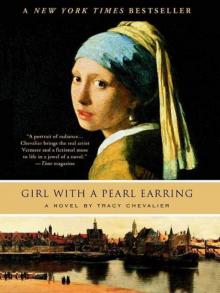 Girl With a Pearl Earring
Girl With a Pearl Earring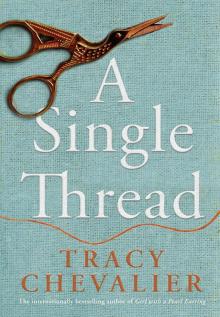 A Single Thread
A Single Thread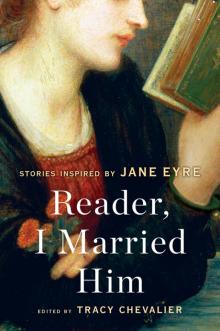 Reader, I Married Him: Stories Inspired by Jane Eyre
Reader, I Married Him: Stories Inspired by Jane Eyre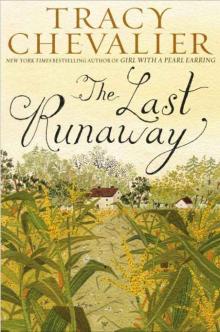 The Last Runaway
The Last Runaway Burning Bright
Burning Bright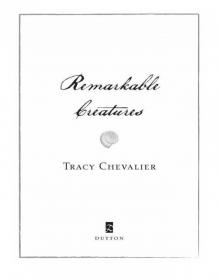 Remarkable Creatures
Remarkable Creatures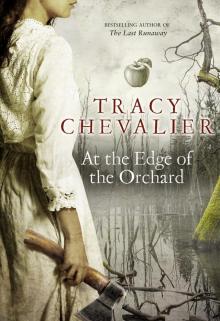 At the Edge of the Orchard
At the Edge of the Orchard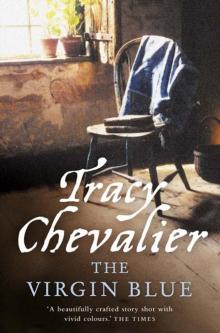 The Virgin Blue
The Virgin Blue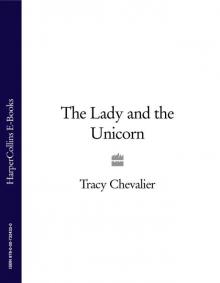 The Lady and the Unicorn
The Lady and the Unicorn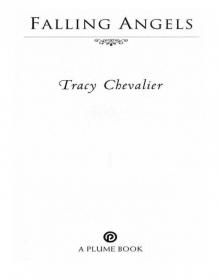 Falling Angels
Falling Angels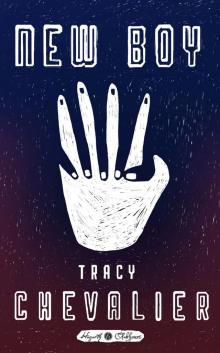 New Boy
New Boy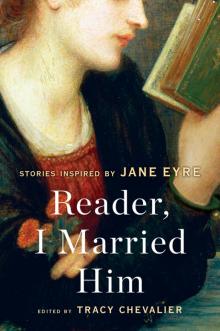 Reader, I Married Him
Reader, I Married Him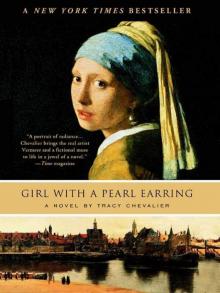 Girl with a Pearl Earring, The
Girl with a Pearl Earring, The